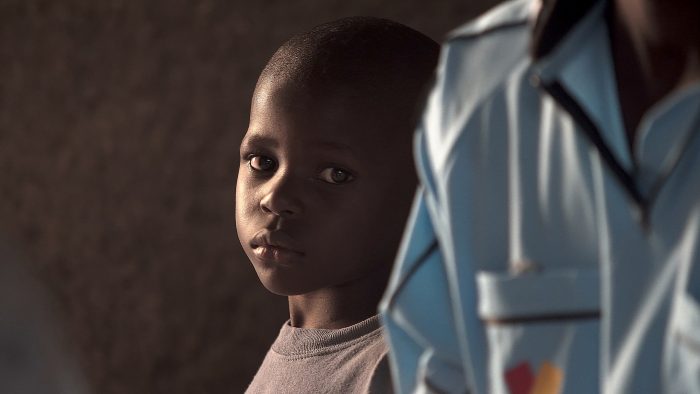“Family love is a magical power that transforms children’s lives.” ~ Innocent Habimfura
~
As I write this, there are over eight million children living in orphanages and childcare institutions.
Every child’s experience is different, but the bottom line is the same: children belong in families, not in orphanages.
For me, growing up in an orphanage was like living in a container.
I lived on a strict schedule—from the time I woke up, playtime, mealtime, and sleeping time, to everything else that I did. My life was even too organized to allow me to mess up. It is only in the recent past that I’ve had the courage to break loose. I now lead a free and normal life where I don’t feel restrained, limited, or controlled.
From infancy, I knew the orphanage as my home. But I grew up questioning my seclusion from a family. I desired freedom; what was beyond the walls was a mystery I wished to uncover.
At first, I had no understanding of why I lived in an orphanage. When I began school, I had lots of questions. While my schoolmates went home, I went to a place where I felt imprisoned—mentally, physically, and emotionally. I was unsettled with the difference, to say the least.
I asked why I didn’t have a home and a family to go to as they did. I was told I was an orphan, a child who had no parents, and therefore, I had to stay in an orphanage. I asked where the parents of orphans had gone, and I was told they had died. I wanted to know who had killed mine, and was told many more things about being an orphan.
These conversations remained with me. I longed to know more about who I was.
But as time went by, I was resigned to knowing only what I had been told. As I grew older, it was interesting to listen to the other children in the orphanage tell stories about their siblings, mums, dads, and other members of their family. I wondered why I knew nothing about my family members, and this dwelled in my subconscious mind.
A lot was demanded of me at the orphanage, to the extent that I never really knew what it was like to be a child. I did what was asked of me, and I felt timid and caged. The surroundings silenced me—I had no voice. At the end of the day, I would retire to bed to repeat the same routine, for years. Surviving on minimal provisions was a life I had to acquiesce to. The details are too traumatizing to recount, but I made it through with grace and gratitude.
Attachment to a loving and caring caregiver is a child’s basic need that cannot be underestimated. Without that kind of attachment, I grew as a “thing,” detached from every encounter in my life. Trust is still a problem—for me, trust is earned, and I am still so cautious.
To give you one example, an inside view:
This incident scared me. I was under 10 years old when I fell down, badly injuring my lower lip and two teeth. My cries from the excruciating pain were ignored, and I was not taken to hospital. So, I found my bravery, and I took myself to the nearest hospital. I was questioned why I was alone, and I explained I was from the orphanage. I was stitched and sent back. My teeth were not attended to, and many years after, I have had to deal with this neglect. I am grateful to the nurses and doctors who treated me in many such instances throughout my stay at the orphanage without asking for payment.
In the fifth grade, I joined a boarding school that was about 40 miles from the orphanage. Using public means, I took myself to school carrying a metal box that I could barely lift. When I became overwhelmed, I would cry for passersby to carry it for me. I am grateful to those who cared to help. At school, visiting days meant nothing.
When I was about to sit for my end of primary school exams, I learned my classmates had three names while I only had two. I did not understand why they had a third name, but despite my confusion, I wanted one for myself as well—I had to fit in. I’d been fondly reading books about saints, and at that time, I was reading about a certain saint. So, I added her name to my names, and voila! I now had three.
While in high school, I do not know what befell the orphanage administrator. All of a sudden, she wanted me out. Every school holiday becomes agonizing. I would be given out to people who would only take me in out of politeness. They often took advantage of me during those stays. Thanks to my intelligence and my refusal to be suppressed, I often would not tolerate this, for within days of being dispatched, I’d always find my way back to the orphanage irrespective of the distance. I felt homeless, for the place I called home no longer wanted me, and the person I thought had my interests had rejected me.
In my school years, no one cared about my performance. No one cared to inspire, encourage, or to even ask how I was progressing. No one asked what my dreams were. A girl who had started as a bundle of possibilities became wrapped up with limited possibilities. Limited by both the environment and a lack of personalized care.
Today, I am on an academic journey, if only to realise my dream of being a doctorate holder and a contributor to the solutions for orphanages. Whatever it takes and however long it takes, I’ll see this dream come true. The challenges are immense, but I am focusing on the goal.
If it’s going to be, it’s up to me!
When I began to work, the discussions in the kitchen revealed the dents in my upbringing. My colleagues noticed my abstinence when they would talk about family matters. But, it is through discussion with them that I have learnt about self-care and modern dressing. These lessons have allowed me to blossom into a modern girl who glows with joy and appreciation for who I have become. I thank them, for without knowing, they have taught me what is obvious to them but unfamiliar to me. It’s hilarious to imagine my excitement the first time they took me to a salon during a lunch break to have my eyebrows shaped and many other firsts.
After leaving the orphanage, I am still reminded of it. I am a loner who enjoys her own company. Holidays remind me I have no family. When going through challenges, I am alone. When I am unwell and I get asked about my family history, I say I have no information. I have gone to hospitals for theatre procedures alone. When asked to introduce myself, I hesitate with uncertainty, for I do not know who I am, nor where I come from. When asked for identification, I question the authenticity of the identity card I carry—it bears the orphanage details.
I belong to a tribe whose language I do not speak and to a community whose cultural practices I do not know.
One may ask, if not orphanages, then what?
The alternative care options are localized, as each societal problem has its own solutions.
It is common knowledge that every child came from somewhere—from a family and a society that is constituted by people. However, due to lack of awareness, our society believes that an orphanage is beneficial to a child. An orphanage simply fulfills some of the child’s basic needs. Sadly, there are detrimental effects, as orphanages often neglect a child’s social, emotional, and cognitive development.
“Poverty is just a lack of resources. Resources we can fix. Love, you can’t buy that. You can’t just pay for that to happen. That needs to happen in a family.” ~ Kate Van Doore
How may we then help these children?
We can help by directing our donations, goodwill, and resources toward strengthening, supporting, enabling, and empowering both the families and communities to eliminate the need to separate children from their families and communities. Rather than sponsoring a child in an orphanage, we can sponsor families and communities.
To sum it up:
>> Orphanages are not traditional in any country or community. They are a symptom of a broken system and rampant capitalist system.
>> Eighty to ninety percent of children in orphanages have a living parent or both, or a next of kin, or community member who, if enabled, would take care of the child.
>> A lack of resources, disability, illness, and for a small percentage of families, dysfunction, are the reasons children end up in orphanages.
>> We have orphans because of the existence of orphanages. Especially the so-called “good orphanages.” Literally speaking, if you build them, children will come. It has become a business enterprise, a highly lucrative and profitable venture asserted by the mushrooming of new orphanages.
>> Volunteerism and short missions are problematic as well—I call them vacations to orphanages. Children are the touristic attraction.
Orphanages deny children their rights and deprive them of what they most need to optimally thrive: to belong to a family and community, to be loved, and to be cared for individually, leading to their healthy development and having equal opportunities.









Read 65 comments and reply